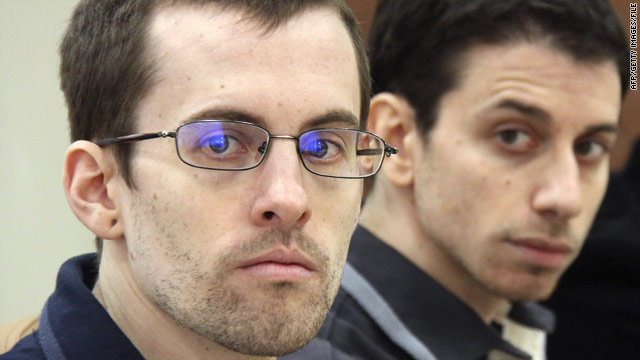Republicans object to Obama's plan to pay for jobs package
He would cover the $447-billion cost by ending tax loopholes and deductions for wealthier families and certain industries.

President Obama, with Vice President Joe Biden, left, appears in the
White House Rose Garden to challenge Republicans to pass
his jobs plan. (Mandel Ngan, AFP/Getty Images / September 13, 2011) |
By Peter Nicholas and Lisa Mascaro, Washington Bureau
5:48 p.m. PDT, September 12, 2011
Reporting from Washington—
President Obama would pay for his $447-billion jobs package by closing tax loopholes and wiping out deductions for wealthier families and specific industries, White House officials said, drawing immediate blowback from Republican leaders.
The exchange Monday echoed the bitter debt ceiling debate that brought the country to the brink of default. Obama largely resurrected ideas that he failed to achieve over the summer when he sought to cut the nation's deficit through a "grand bargain.'' Republicans insisted they would not support what they characterized as tax increases.
Because little has happened to alter the political dynamics in Washington since those negotiations, Obama appears to be following a political strategy that does not rely on Republicans having a change of heart. Rather, the idea is to portray GOP leaders as facing a choice in an election season: Pass a plan that boosts the economy and promotes job growth, or protect oil companies, hedge fund managers and the most well-off households.
Yet the quest for new revenue also shows the White House has few other options to pay for its jobs package, particularly amid repeated calls from Republicans in Congress to reduce the size of government. Economists have warned that abruptly cutting spending could stall the fragile economy, and they instead prefer a mix of short-term stimulus paired with longer-term deficit reduction.
Obama supports that approach and believes a majority of Americans agree, and he has launched a road show to sell his plan to the public and enlist its help in persuading Republicans to give in on new revenue. Obama is asking taxpayers make their views known in calls and emails to Congress.
"Use one of those airplane skywriters. Dust off the fax machine. Or you can just, like, write a letter," Obama said in a Rose Garden appearance.
"The bottom line is, when it comes to strengthening the economy and balancing our books, we've got to decide what our priorities are. Do we keep tax loopholes for oil companies — or do we put teachers back to work?''
Since Obama rolled out his jobs package Thursday, Republicans have suggested that they are open to compromise. But as the White House revealed more specifics about how it would attack the 9.1% unemployment rate, Republican objections bubbled up, even as they chose their words carefully to avoid the public perception that they are blocking Obama's every move.
Rep. Eric Cantor (R-Va.), the majority leader who skirmished with the president during the debt ceiling fight, told reporters Monday that House Republicans stand ready to work with Obama.
"Why don't we just sit down and talk?" Cantor said. "We've had enough of this posturing."
But in the same breath, Cantor dismissed key elements of Obama's proposal.
Neither side shows any sign of moving off its positions. The two parties may find common ground on ideas such as cuts to payroll taxes — popular among politicians and consumers alike. But Republicans are wary of other key components of Obama's program.
Obama's proposal for putting Americans back to work rebuilding roads and bridges is a non-starter to Republicans: Cantor called it another round of "stimulus" spending. GOP leaders also want no part of Obama's proposal to raise taxes on the wealthy.
House Speaker John A. Boehner (R-Ohio) remains "eager" to work with the president, but "this proposal doesn't appear to have been offered in that bipartisan spirit," said Boehner spokesman Michael Steel.
Another sign of a bruising fight ahead is the legislative path forward. The president has prodded Congress to "pass this bill" and called for a quick up-or-down vote. Boehner suggested it would be better to take a piecemeal approach.
"[We] assume that your ideas were not presented as an all-or-nothing proposition, but rather in anticipation that the Congress may also have equally as effective proposals to offer for consideration," Boehner wrote in a letter to Obama.
What seems probable is that the Senate will take up the bill in the weeks ahead. But it is unlikely to garner the 60-vote super-majority needed for passage and, at that point, it would be carved into smaller pieces.
Obama would pay for his plan by limiting deductions and some exemptions for families earning more than $250,000 a year and individuals making at least $200,000 — raising $400 billion over the next decade.
He also would end tax breaks for oil and gas companies, raising $40 billion. Investment fund managers would face a higher tax rate on interest earned, bringing in $18 billion. Eliminating a tax break for corporate jet owners would net $3 billion.
Taken together, the proposals would more than cover the cost of the jobs package, White House officials said.
In the debt ceiling talks, Obama was often stuck in closed-door negotiations with Republican leaders, a forum that did not play to his strengths. This time, he's making full use of the bully pulpit, visiting key swing states to encourage grass-roots pressure on GOP lawmakers. He'll visit Columbus, Ohio, on Tuesday, and Raleigh, N.C., on Wednesday.
By focusing solely on tax increases to pay for the jobs package, Obama signaled a change in strategy that should hearten Democrats who have clamored for the president to be a tougher negotiator. They want to establish clear lines between Democrats and Republicans, believing Americans will be on their side.
To pay for his jobs package, the president declined to propose revenue that could be gained by making changes to Medicare and Medicaid, programs that are dear to Democrats.
Instead, the White House indicated that changes to those entitlement programs will be part of the debt reduction package Obama will put forward later this month as he makes his recommendations to the new congressional "super-committee." The committee is charged with recommending how to trim $1.5 trillion from the nation's deficits over the next 10 years.
Another change in tactics is Obama's decision to send Congress the proposed bill. On past issues, he has been criticized for letting Congress shape legislation while he stood back and offered guidance. At his Rose Garden appearance, he held up a copy of the American Jobs Act' for all to see.
Polls show that Americans are largely on Obama's side in asking upper-income households to pay more. The higher-income families that would be snared in the tax increases account for fewer than 2% of all taxpayers, or roughly 3 million households.











